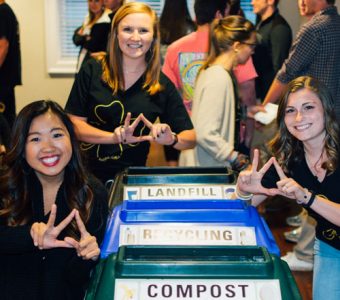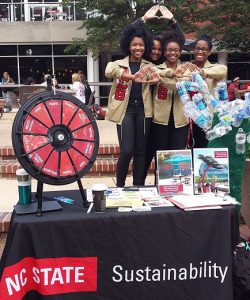
At Kappa Delta Sorority’s annual Shamrock ‘N Score event in March, the event looked different. Like always, the fundraiser generated donations for SAFEchild Raleigh and Prevent Child Abuse America. But amid the corn hole tournament, silent auction and dessert buffet, were fingerprints of a sorority that had embraced sustainability as one of the event’s hallmarks.
“We decided to make our annual Shamrock event sustainable simply because of NC State’s overall sustainability mission,” said environmental engineering student Elizabeth Wallner, who coordinated the event’s sustainability efforts. “Since Kappa Delta Sorority is a university organization, we felt it necessary to incorporate sustainable practices in our event to support other efforts across campus.”
The sorority utilized the University Sustainability Office’s Wolfpack Certified Sustainable events program to guide its sustainability efforts. The program offers certification at three levels for events that embed sustainability into planning efforts.
On its way to earning recognition at the champion level, Kappa Delta appointed a sustainability coordinator for the event, held the event at a location accessible by the Wolfline campus bus system and designed a digital promotion plan to reduce paper waste. Event organizers borrowed items, selected reusable and locally-made products when possible, provided locally-sourced food options and raised money for two service-oriented organizations. The sorority also utilized compostable plates, cups and silverware and offered compost and recycling stations to reduce the amount of waste sent to landfills.
“We enjoyed getting creative and learning more about sustainability and how we can contribute. We’re looking for other ways to adopt sustainability within our chapter. Overall, this experience has lead us in a positive direction and we hope this encourages other Greek organizations to do the same,” Wallner said.

Among fraternity and sorority organizations that have also pursued sustainability at their events are Chi Omega Sorority, which certified its Pancake Dinner in the fall, and Alpha Phi Alpha Fraternity, which certified its Eta Omicron Cookout at the champion level.
Alpha Phi Alpha also hosted an event called “wHOse Earth Is It?” to raise sustainability awareness among its members. Several sororities have hosted similar events such as Alpha Kappa Alpha and Delta Sigma Theta, which offered an outreach event on NC State’s Brickyard to spread sustainability awareness among students. In April, Pi Alpha Phi Fraternity featured NC State professor Francis De Los Reyes, who spoke about his research on sanitation and clean water in developing countries.
This year’s efforts in sustainable events build on other recent sustainability advances in fraternity and sorority life. Since 2013, NC State has offered a Most Sustainable Chapter Award as part of the university’s annual Greek Life awards. Past winners include Omega Psi Phi Fraternity, Alpha Kappa Alpha Sorority, Delta Zeta Sorority, Sigma Chi Fraternity, Lambda Theta Phi Latin Fraternity and Alpha Kappa Psi Business Fraternity.